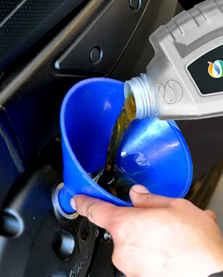
Choosing between synthetic oil and conventional engine oil can be confusing until you know about them. Conventional oil was considered best until the introduction of a high-performance engine that needed a superior engine oil to prevent its wear and tear and offered superior performance. Synthetic oil fits the bill perfectly for long-lasting maintenance and performance.
But the drawback here is that synthetic oil is costlier than conventional oil, which forces many to rethink their choice. So here is a comparison between these engine oils to make your choice easier.
Conventional OilThe conventional engine oil is the crude petroleum oil refined several times over and added with a few additives for better functioning. This oil is chosen over the other options by many because of its affordability.
Pros- It can withstand normal operating conditions thus making it a better choice for older vehicles.
- It is an economical option over synthetic oil.
The biggest drawback of conventional oil is that it needs to be changed frequently. Even though it sustains higher temperatures, it gets decomposed and evaporates just as quickly.
The decomposition and the crude nature of the oil produce more sludge that can clog the engine.
The structure of mineral oil molecules make it not so suitable for low temperature and results in poor fuel economy

Synthetic engine oil uses a superior grade base and many other man-made components in the form of additives and other ingredients. The formulation gives it evenly sized and shaped molecules that offer uniform performance, better circulation, higher sustenance, and better compatibility with the climate changes.
Pros- Synthetic oils can withstand heat and keep their molecules bound together. This prevents faster decomposition and offers protection for the engines longer.
- It is a purified form of oil. There are fewer chances of impurities passing on to the engine. Instead, it cleans up the engine parts yet does not cause sludge to accumulate and helps remove it promptly.
- This type of engine oil circulates smoothly within the engine parts.
The only disadvantage of synthetic oil over conventional oil is that it is expensive. Even if the price range is high, it does not nullify the fact that synthetic engine oil can perform better than conventional oils and most importantly, protects the engine and enhances the life of the engine.
The best choiceModern automakers are relying more on the power of the engine rather than the size. This change requires it to work quicker, smoother, and longer. All of these are possible when there is equally well-performing engine oil to lubricate and maintain the engine parts. The comparison here shows that even though conventional oil has its perks, synthetic oil has a far better reach to be the clear winner.